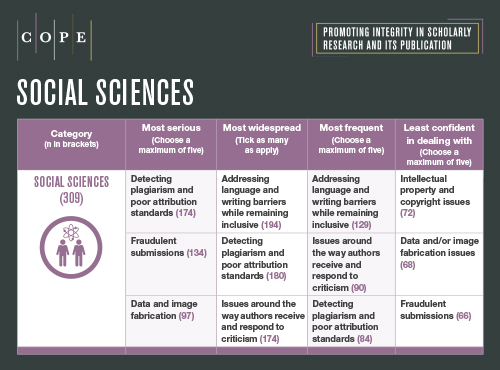In 2019 COPE, with the support of Routledge (part of the Taylor & Francis Group), commissioned primary research with Shift Learning to better understand the publication ethics landscape for editors working on journals within the arts, humanities, and social sciences. The results from Social Sciences journals show which are the most serious, most widespread, most frequent issues, and those editors are least confident in dealing with.
Addressing language and writing barriers were cited as major ethics issue faced by Social Sciences journal editors. This group of editors also reported that detecting plagiarism and poor attribution standards was the most serious issue they faced and that issues around intellectual property and copyright were those they felt least confident addressing.
Most serious
- Detecting plagiarism and poor attribution standards
- Fraudulent submissions
- Data and image fabrication
Most widespread
- Addressing language and writing barriers while remaining inclusive
- Detecting plagiarism and poor attribution standards
- Issues around the way authors receive and reasons to criticism
Most frequent
- Addressing language and writing barriers while remaining inclusive
- Issues around the way authors receive and respond to criticism
- Detecting plagiarism and poor attribution standards
Least confident in dealing with
- Intellectual property and copyright issues
- Data and/or fabrication issues
- Fraudulent submissions
